ZGCTA Activities
Think Tank Alliance Participates in Hosting the 2024 International Forum on Senior Care Science and Innovation
Date:2024-11-06 15:22
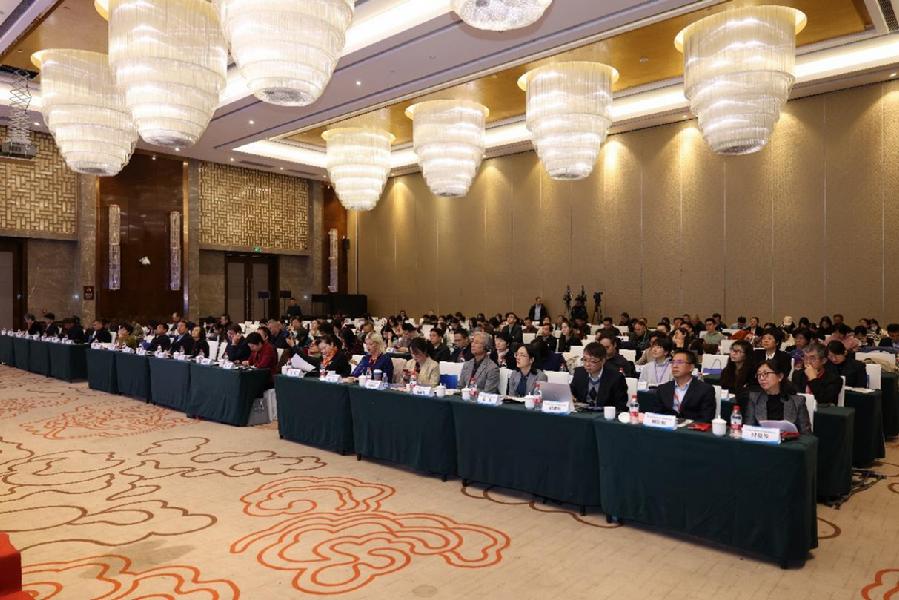
Forum Site
On October 24, the 9th International Forum on Senior Care Science and Innovation, part of the Zhongguancun Forum series, and the “Innovation Link” series of events were successfully held in Beijing. The forum is co-organized by Beijing Academy of Science and Technology (hereinafter referred to as "BJAST"), Beijing Association for Science and Technology, Beijing Advanced Innovation Center for Biomedical Engineering (Beihang University), and ZGC Global High-Level Think Tank Alliance (hereinafter referred to as "Think Tank Alliance"), and hosted by Institute of Smart Aging, Beijing Academy of Science and Technology, Beijing Science and Technology International Exchange Center, Center for International and Regional Cooperation of BJAST, Center for Science Communication of BJAST, and Zhongguancun International Exhibition Management Co., Ltd., and co-organized by Beijing Yiyang Technology Co., Ltd., Beijing Institute of Nutritional Resources, Beike Nutrition and Health Industry (Tianjin) Co., Ltd., Institute of Smart Aging, Renmin University of China, 50-person Forum for Smart Aging, and Beijing Kaiyikang Food Technology Co., Ltd. The forum was held in a combination of online and offline formats. More than 200 people registered offline to attend the conference, and it was broadcast live simultaneously on online platforms such as the Zhongguancun Forum, the official account of BJAST and Beijing Science and Technology News. Nearly a thousand people attended the conference online. The theme of this forum is "Technology Empowers: Innovation and Practice in Smart Aging", aiming to exchange the latest developments in international smart health care in the context of aging society governance. 37 experts and scholars from government departments, research institutes, universities, enterprises and scientific and technological service agencies from China, the Netherlands, Finland, Denmark, Japan, South Korea and other countries spoke on topics related to global smart health care innovation.

Group photo of participants
Wu Jianmin, Chairman of the ZGC Global High-Level Think Tank Alliance and President of the Beijing Academy of Science and Technology, Marc van der Linden, Counselor for Health, Welfare and Sports of the Embassy of the Kingdom of the Netherlands in China, Li Xin, Executive Vice Chairman of the Beijing Association for Science and Technology, and Wang Yuxiao, Second-level Inspector of the Beijing Municipal Civil Affairs Bureau, delivered opening speeches at the conference.
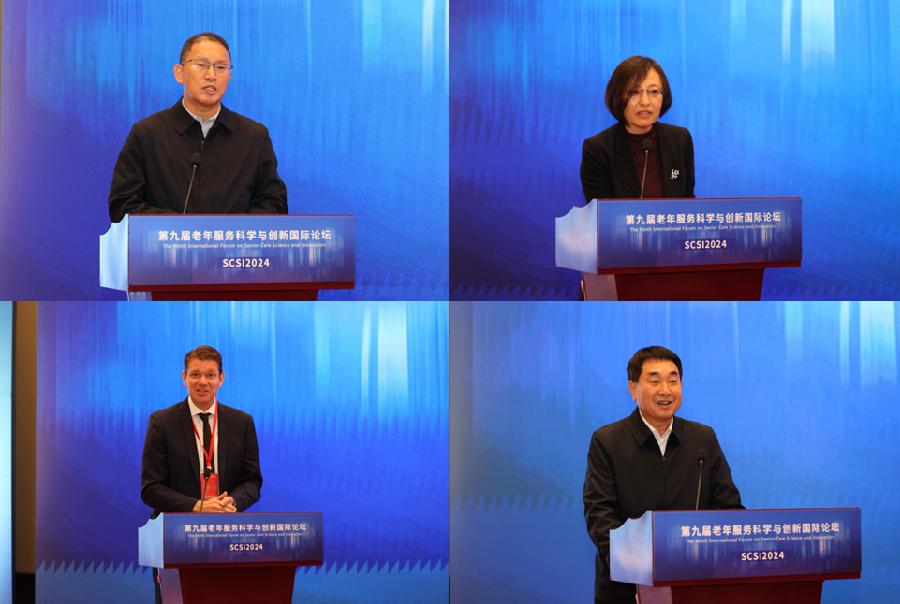
Speakers
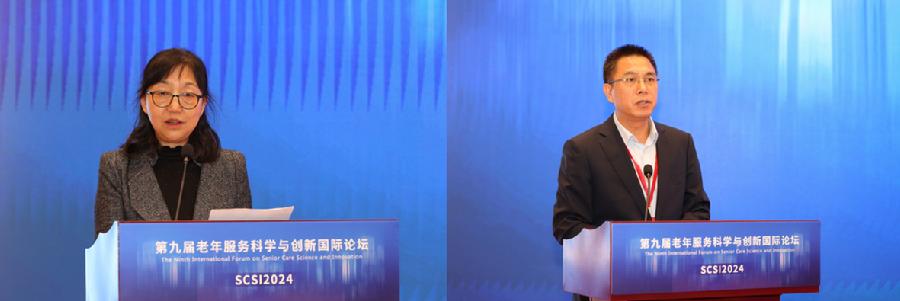
Hosts
Wu Jianmin pointed out in his speech that the BJAST began to develop smart elderly care technologies in 2010, creating various application scenarios for different elderly groups and carrying out many beneficial explorations. Today's forum is an important communication platform that has been formed in the process of innovation and practice of smart elderly care over the years. The International Forum on Senior Care Science and Innovation was founded in 2015 with the aim of providing a space for communication and cooperation for researchers, scholars and practitioners in the field of elderly care services, and promoting the integration of knowledge and collaborative innovation in the field of senior services. Many well-known experts in the field were invited to give academic reports, and held discussions on key technologies and applications of smart elderly care, health care equipment, nutrition and health for the elderly, elderly care policies and industrial innovation, and shared the latest technologies, innovative models and practical experiences of smart elderly care at home and abroad. It is hoped that this forum will become a stage for exchanging the latest concepts of elderly care services, a link for the convergence of advanced experience in elderly care services, and a platform for the integration of innovative ideas in senior care science and technology. It is hoped that the experts and scholars participating in the forum and people from all walks of life who care about the cause of aging can use the forum as a platform to showcase scientific research results, express opinions and suggestions, exchange ideas and views, spark new ideas, build consensus on wisdom, jointly seek innovative development, and promote pragmatic cooperation, so as to contribute greater efforts to promote the high-quality development of the senior care industry.
Li Xin mentioned in his speech that the event aims to build a platform for communication and cooperation for relevant personnel around the world. He hopes that the forum will provide useful reference for Beijing to cope with aging. The Beijing Association of Science and Technology will continue to leverage the platform's advantages, enhance its international vision, pool resources from multiple parties, serve scientific and technological workers, and support the development of the elderly care industry. Linde said that the Dutch government is committed to building a society where the elderly feel they are concerned, respected and cared for, which is in line with China's culture of respecting the elderly. Both countries are seeking technological solutions to support independent living for the elderly and reduce the burden on caregivers. Wang Yuxiao pointed out that in order to meet the challenges brought by aging, the Beijing Municipal Civil Affairs Bureau has continued to innovate and improve the unique elderly care service system in Beijing and has carried out a large number of fruitful practices. We hope that the forum will inspire innovation, build consensus, and enhance the public's understanding of aging.
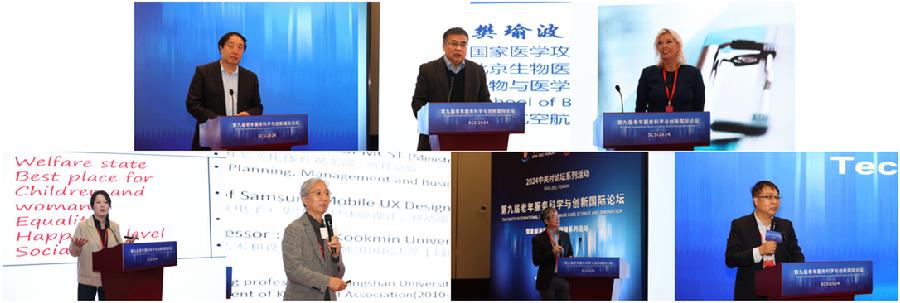
Keynote Speakers
Professor Du Peng, former vice president of Renmin University of China, dean of the School of Population and Health, and director of the Institute of Gerontology, Professor Fan Yubo, dean of the School of Biological and Medical Engineering and the School of Medical Science and Engineering of Beihang University, Ulla Nurmenniemi, vice president of the Finnish Chamber of Commerce in Beijing, Associate Professor Hu Yimei from the Business School of Aalborg University, Denmark, Jeung Jihong, chief researcher of the Future Lab of Tsinghua University, Professor Bai Shaoping from the School of Engineering of Aalborg University, Denmark, and Researcher Liu Jianbing from the Institute of Smart Aging of the Beijing Academy of Science and Technology gave keynote speeches at the conference.
Du Peng discussed the importance and countermeasures of promoting high-quality development of smart home-based elderly care services, emphasized the urgency of actively responding to the aging strategy, and proposed that high-quality development of smart home-based elderly care services is of vital importance. Fan Yubo introduced the innovations in rehabilitation technology based on biomechanics, including the application of mechanobiology and research on various rehabilitation technologies, and emphasized the challenges and directions facing this field. Wu Lan introduced the trends and findings of technology implementation in home care in Finland, pointing out the speeding up of aging in Finland and the digital technology is widely used in home care to improve efficiency. Finland's "Technology Support for Smart Elderly Care and Home Care Project" (KATI) coordinates technology to support home-based care for the aged. Hu Yimei introduced Denmark's cradle-to-grave welfare system, emphasizing its equal and comprehensive social welfare system, especially Denmark's personalized home-based elderly care model, which uses technology to enable the elderly to live more independently and with dignity at home. Zheng Zhihong discussed the relationship between human-computer interaction and aging, and pointed out the challenges and future research direction faced by human-computer interaction in the field of aging. Bai Shaoping focused on the innovation and application of wearable technology in the field of exoskeleton, traced the historical development of exoskeleton technology, shared related successful application cases, and proposed that related research and development applications will play an important role in the aging society in the future. Liu Jianbing pointed out that the management framework of information technology application in China's elderly care service has been initially established and is still in its early stages. There are many problems and it is necessary to formulate standards to improve the level. The experts' reports show the efforts and exploration results of different countries and regions in coping with population aging from many aspects.
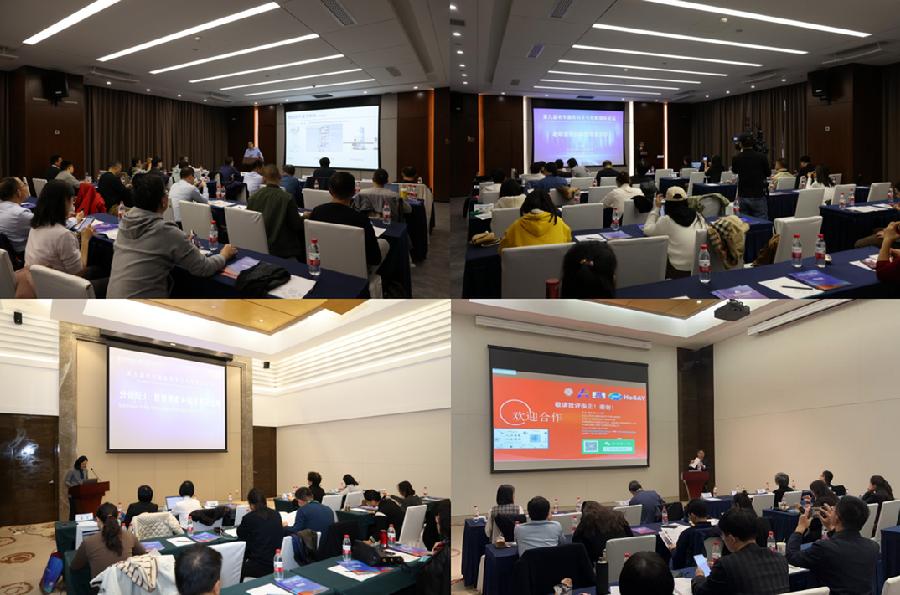
Sub-forum Venue
The four sub-forums in the afternoon mainly involved health care equipment, nutrition and health for the elderly, key technologies and applications of smart elderly care, and innovation and industrialization of smart elderly care. Two experts from the think tank alliance delivered keynote speeches at the sub-forums on health care equipment and smart elderly care innovation and industrialization respectively.
In the sub-forum on health care equipment, experts and scholars discussed technological innovation, smart applications and future trends, focusing on the opportunities and challenges of the rehabilitation assistive device market, analyzing the application of robotics technology in clinical rehabilitation and the development of self-powered biosensors and other topics. Bai Weimin, chairman of Anton Health Technology Co., Ltd., a member of the think tank alliance, shared the application results of digitalization, intelligence and core R&D technologies in the traditional Chinese medicine industry. Anton has built a large model of health management and disease warning through the Tianhui Traditional Chinese Medicine Model, Clinical Diagnosis Model of Western Medicine, and Personal Health Model. It has focused on adding a "Comprehensive Knowledge Base of TCM Disease Prescriptions" and provides conditioning plans from the aspects of diet therapy, meridian health care, exercise suggestions, etc. Anton not only monitors physical health trends, but also provides health management solutions. This provides practical experience and regional reference for the development and innovation of the traditional Chinese medicine industry, and further promotes the intelligent exploration of traditional industries.
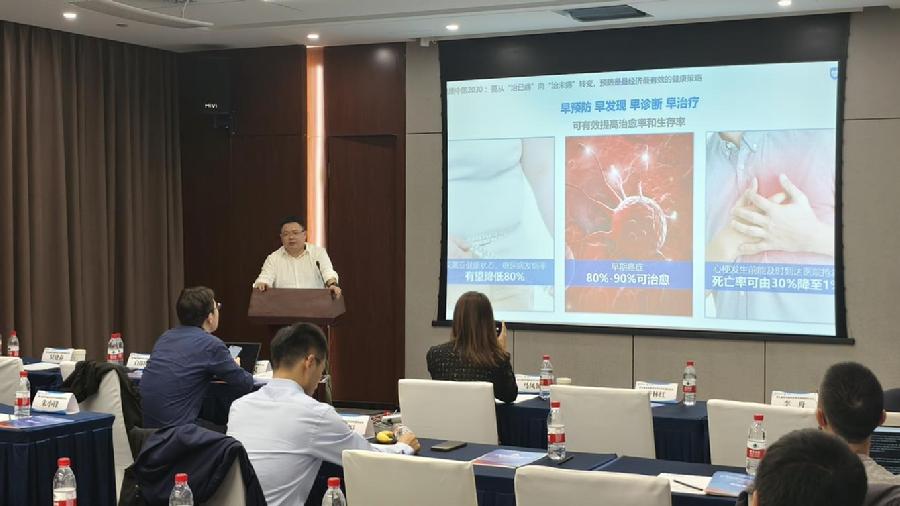
Report by Bai Weimin
At the sub-forum on innovation and industrialization of smart elderly care, experts and scholars shared the topics in depth such as aging-friendly transformation in the silver age, smart products, and new scenarios on the community support for elderly care. Ms. Fu Xiaoyun, Deputy Director of the Financial Research Institute of Hualue Think Tank, a member of the Think Tank Alliance, gave an in-depth analysis of the key concept of "Internet + Financial Scenario". She elaborated in detail how Internet technology can be deeply integrated with financial scenarios, thereby providing strong support for constructing a financial ecosystem of smart elderly care for commercial banks.
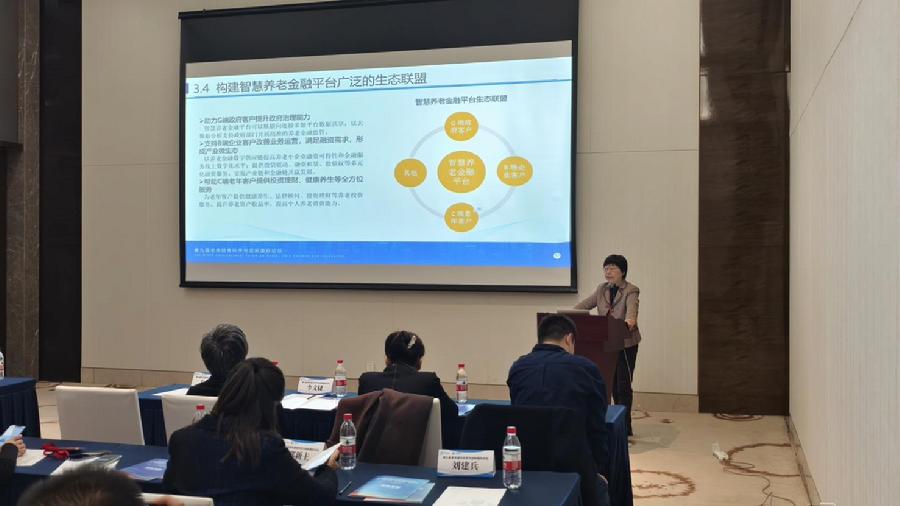
Report by Fu Xiaoyun
At the sub-forum on nutrition and health for the elderly, experts proposed new dietary guidelines, concerned the frailty of the elderly, promoted special medical foods, emphasized the standardization of elderly food, analyzed the new nutritional needs of people at the age of 50+, and explored solutions such as eating disorders and special care diets, jointly helping to improve the health level of the elderly and promote the development of a healthy aging society.
The sub-forum on key technologies and applications in smart elderly care brought together many experts from Japan and China. They discussed smart elderly care technologies and applications, covering areas such as smart health care, rehabilitation assessment, sleep breathing technology, early identification of Alzheimer, elderly movement assessment and intervention, gait stability and fall risk assessment, and introduced Japan's innovative products to improve the lives of the elderly.
The forum not only provides a valuable platform for communication and cooperation for experts and scholars in the field of smart elderly care around the world, but also further promotes the innovation and application of smart elderly care technologies. In the future, the think tank alliance will continue to leverage the platform's advantages, gather more high-quality resources, and assist in knowledge integration and collaborative innovation in the field of elderly services. We look forward to working together with all parties to contribute more wisdom and strength to promoting the high-quality development of the elderly care industry.
Texts by Institute of Smart Aging, Beijing Academy of Science and Technology, the Secretariat of ZGC High-Level Think Tank Alliance
Photos by Center for Science Communication, Beijing Academy of Science and Technology
